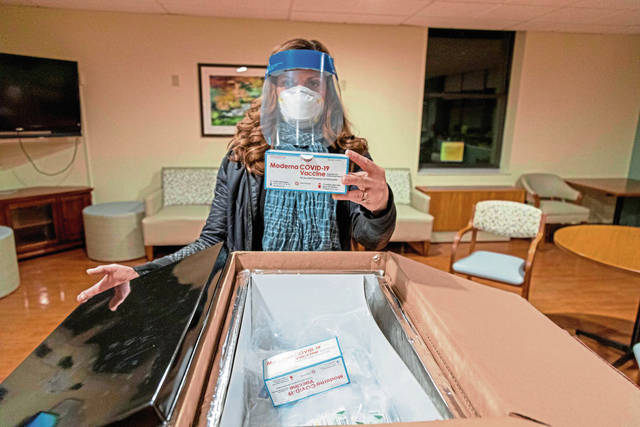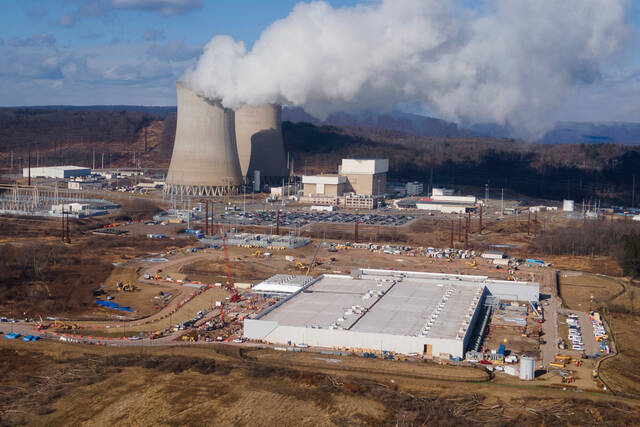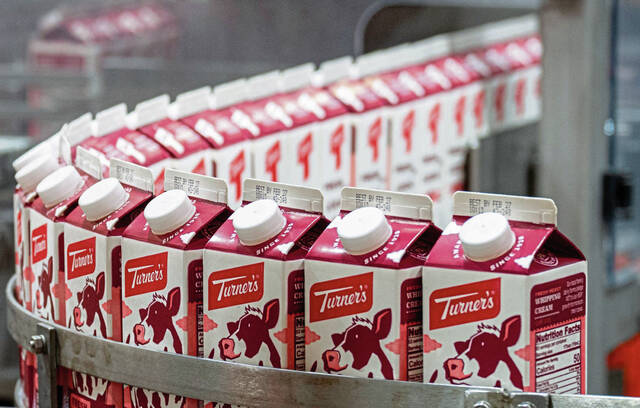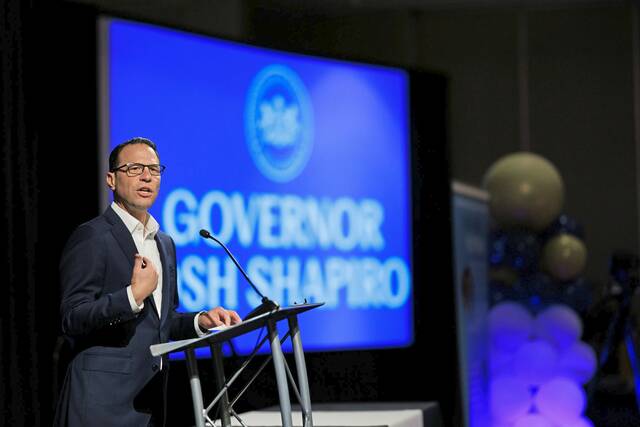Much is still unknown about how vaccines are being distributed in Pennsylvania’s nursing homes, but operators and advocates are optimistic and excited for the milestone.
Skilled nursing facilities across the state began receiving their first doses of covid-19 vaccine Monday, through a partnership between the federal government and two national pharmacy chains, CVS and Walgreens.
Since then, nursing homes across Western Pennsylvania have announced their plans to immunize residents and staff.
“Operation Warp Speed is a blessing,” said John Dickson, executive director of Redstone Highlands, referring to the private-public partnership to deliver vaccines. Dickson said Redstone, which has facilities in Greensburg, North Huntingdon and Murrysville, got word last week that the Greensburg location will receive doses Jan. 11.
A lot is still unknown about the distribution process. Providers, advocates and officials alike are unsure of how nursing facilities are scheduled to receive vaccines — which facilities get to go first and how that is determined. Zach Shamberg, president and CEO of the Pennsylvania Health Care Association, said there is “limited visibility” into how those decisions are made.
“We’re not sure how it’s being determined, based on geographic area, region, positivity rate, where the vaccine clinics are beginning or where they’re going to end,” he said.
Shamberg said he is disappointed immunizations did not begin in the state’s nursing homes sooner. Vaccines first arrived in Pennsylvania two weeks ago, but several states did not begin vaccinating in nursing homes until Dec. 21 because they opted to do so through the federal pharmacy partnership.
“This could have been done weeks ago,” Shamberg said, noting some neighboring states are nearly finished administering the first round of doses to long-term care residents.
Health Secretary Rachel Levine said vaccine distribution in long-term care facilities was a project by the federal government, and the state Department of Health had little specific information about which facilities are receiving vaccines first.
“It’s important for me to emphasize that this is really the federal government’s program,” Levine said.
Levine said members of Operation Warp Speed, a partnership that includes the Centers for Disease Control and Prevention and the U.S. Department of Health and Human Services, are coordinating with nursing homes directly to select locations, obtain the necessary consent from residents and family members and schedule clinics.
Turnaround ‘celebrated’
Despite the lapse in communication, providers and advocates who spoke with the Tribune-Review are mostly pleased with how the vaccine rollout is going. Shamberg called it a “celebration.”
“It really is amazing to watch,” Dr. David Nace, chief medical officer of UPMC Senior Communities, said Tuesday, shortly after administering the first doses at UPMC Heritage Place in Squirrel Hill. “We get vaccine within nine months of this pandemic, which is unheard of. I really did not expect to see vaccine before January. … To see that kind of progress very quickly is amazing.”
For many nursing home chains, vaccine distribution is staggered and varying.
Presbyterian SeniorCare, which operates 15 skilled nursing facilities in Western Pennsylvania, has scheduled dates for seven of its facilities so far, with clinic dates ranging from this week until mid-January. The Southmont campus in Washington received the first doses Tuesday, spokeswoman Lisa Fischetti confirmed.
All 15 Presbyterian SeniorCare nursing homes are working with CVS, Fischetti said. They began by participating in a webinar that explained all of the necessary consent forms and other instructions. The chain provided a point of contact to work directly with CVS Health and was given tentative dates for clinics for some of its eligible facilities. Then, Fishetti said, the chain received follow-up communications confirming or adjusting some of the dates. The chain’s Longwood Hanna Healthcare Center in Oakmont, for example, was tentatively scheduled for Jan. 4 — when the clinic was confirmed, it was moved up a day.
Fischetti said the process has been fairly efficient from Presbyterian SeniorCare’s perspective. She said she believes the federal government did a good job of “managing expectations” and keeping the chain informed throughout the scheduling process.
“I think that these vaccination clinics are probably going to be one of the best organized aspects of this whole covid journey,” Fischetti said.
Fishetti noted there doesn’t seem to be a clear pattern for which facilities are scheduled first. Presbyterian SeniorCare has two facilities in Erie County — their clinics are not scheduled during the same week, for instance.
“I have no idea how their algorithm works,” she said.
Shamberg said he has heard from some providers who still haven’t heard back from their pharmacy partners and are feeling lost in the clinic-scheduling process. There are many providers still waiting for details, he said.
But it’s still very early in the process, and Shamberg guessed many of the delays likely could be explained by the fact the system is still being perfected even after it has been deployed — much like the rapid testing that was deployed during the summer months.
“I think it’s too early to tell, and it’s obviously a huge lift,” he said.
At UPMC, Nace echoed that sentiment. Many providers who spoke to the Tribune-Review were understanding about any delays they have seen and were impressed with the speed the system has achieved so far.
Though UPMC is administering vaccines through its own in-house pharmacy — meaning administrators can set their own clinic dates and return to facilities if needed — they still rely on the doses to be delivered by the federal government. There is uncertainty whether the system will get the exact number of doses requested on the timetable they would hope for.
“It’s a challenge because we (the nation) have several million long-term care residents and an equal or greater number of long-term care staff that need to get the vaccine in this priority group,” Nace said. “It’s not that anybody is doing anything wrong — it’s just that this is a major operation to pull this off.”
Paul McGuire, chief operating officer at Quality Life Services, said the 10-facility chain reaches out to its pharmacy contacts daily, being a “squeaky wheel” to make sure they received vaccine doses in a timely manner. McGuire said seven facilities are working with Walgreens and three are working with CVS Health. Facilities were notified late last week of their official clinic dates, he said.
The chain’s facility in Johnstown, QLS-Westmont, is set to be the first to receive doses, scheduled for Wednesday. From there, other facilities have days scheduled throughout the next few weeks, with the Apollo location in Washington Township currently with the latest date of Jan. 12.
Members of the pharmacies’ team will visit each location and stay for several hours, administering vaccines to residents and staff.
“We try to be flexible and fluid with everything,” McGuire said. “They’re trying to do a lot in a little time, and we’re just trying to be cooperative and work with them.
The prospect of a vaccine at QLS facilities — several of which have experienced covid-19 outbreaks in the past 10 months — is an exciting feeling, McGuire said. Administrators began communicating with staff and residents about it several weeks ago. He estimated the vast majority of QLS residents and staff have consented to take the vaccine.
Even with vaccine, fight not over
Fischetti, at Presbyterian SeniorCare, noted even after the vaccines have been administered, the pandemic will not be over in long-term care facilities — which have accounted for nearly 60% of all covid-19 deaths in the state.
“This vaccination opportunity just adds to our toolkit of weapons in the fight against covid,” Fischetti said. “This doesn’t mean that we’re at the end of the war. This means that we have a big battle that we’re winning, but the war isn’t won yet.
“And the reason why the war isn’t won is because these vaccines are so new, we have no idea how long they can protect us.”








